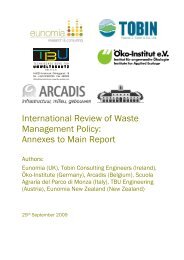Report of the Local Government Efficiency Review Group
Report of the Local Government Efficiency Review Group
Report of the Local Government Efficiency Review Group
Create successful ePaper yourself
Turn your PDF publications into a flip-book with our unique Google optimized e-Paper software.
8.4.12 For example, recruitment to senior positions in local government are<br />
conducted through <strong>the</strong> Public Appointments Service (PAS), while<br />
recruitment and promotion at lower grades is managed locally. The <strong>Group</strong><br />
considers that having recruitment for all clerical, administrative, and<br />
pr<strong>of</strong>essional staff conducted through a central specialised body such as <strong>the</strong><br />
PAS would allow local government HR staff concentrate on core functions,<br />
as well as realising efficiencies from economies <strong>of</strong> scale in recruitment<br />
processes. Such a move could represent an overall annual saving <strong>of</strong> some<br />
10% on recruitment costs.<br />
8.4.13 The amalgamation <strong>of</strong> a number <strong>of</strong> housing bodies including <strong>the</strong> National<br />
Building Agency, Affordable Homes Partnership, <strong>the</strong> Centre for Housing<br />
Research, and <strong>the</strong> Homeless Agency into a single agency, <strong>the</strong> Housing and<br />
Sustainable Communities Agency, should produce efficiencies in supporting<br />
<strong>the</strong> work <strong>of</strong> local authorities in <strong>the</strong> provision <strong>of</strong> housing services.<br />
8.4.14 The <strong>Group</strong> also believes that consideration could be given to extending <strong>the</strong><br />
shared services model in a range <strong>of</strong> o<strong>the</strong>r areas beyond ‘back <strong>of</strong>fice’<br />
corporate functions.<br />
8.5 Regional or ‘Lead Authority’ Approach to Service Provision<br />
8.5.1 <strong>Local</strong> authorities carry out many <strong>of</strong> <strong>the</strong> same functions and activities under<br />
<strong>the</strong> same legislation. Staff require similar skills, training and expertise in<br />
particular areas, for example, to comply with <strong>the</strong> requirements <strong>of</strong> new<br />
legislation. While local circumstances and priorities may sometimes differ,<br />
<strong>the</strong>re are never<strong>the</strong>less opportunities for greater cooperation between local<br />
authorities in service provision.<br />
8.5.2 Again as noted above, local authorities are far from starting with a blank<br />
page in terms <strong>of</strong> shared service provision. The lead authority approach, in<br />
particular, has been used in several service areas, such as for water quality<br />
monitoring and protection for each River Basin District, for waste<br />
management planning, and for major road construction projects. That said,<br />
it is not always clear to <strong>the</strong> <strong>Group</strong> why only some authorities have engaged<br />
in a shared service approach.<br />
8.5.3 The <strong>Group</strong> has <strong>the</strong> impression that shared service delivery (in areas like<br />
motor tax and fire services) has evolved in certain parts <strong>of</strong> <strong>the</strong> country, but<br />
not o<strong>the</strong>rs, for reasons <strong>of</strong> tradition and local convention, ra<strong>the</strong>r than a<br />
fundamental examination <strong>of</strong> <strong>the</strong> business case for shared provision. It is not<br />
clear to <strong>the</strong> <strong>Group</strong> why Waterford City and County, or Limerick City and<br />
County operate separate fire services, whilst Galway County Council can<br />
operate a shared service for both Galway City and County. Shared services<br />
also appear to be most commonly used in terms <strong>of</strong> <strong>the</strong> introduction <strong>of</strong> new<br />
services such as <strong>the</strong> NPPR charge, but less frequent when it comes to<br />
examining existing more embedded approaches towards service delivery.<br />
91
















